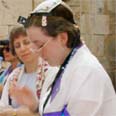
After probing the issue in the past few months, the organization's rabbis, both men and women, found halachic sources allowing them to permit an act which has been considered a taboo for hundreds of years.
"The goal of the Kaddish is to benefit the soul of the deceased, and that is also a mental coping method," explains Rabbi Ronen Neuwirth, Beit Hillel's director-general. "Many women, both religious and secular, are interested in saying Kaddish today, and there is no reason why they shouldn’t be able to do it.
"In the United States it's common – but in many synagogues in Israel, if a woman wants to say Kaddish she will be silenced. We want to make it a standard in every community interested in it, especially in cases where women have no brothers. I have no doubt that we'll be criticized, but it's all based on the Halacha (collective body of Jewish religious laws)."
The halachic ruling is issued on behalf of the organization's 170 male and female rabbis, stating that a woman may say the Kaddish prayer in any forum of 10 men over the age of 13 (a quorum).
"The orphan may say Kaddish even if she is not the only person saying it," the ruling states," but it would be appropriate if one of the men joined the Kaddish reading even if he is not obligated to do so."
Moreover, according to the ruling, "There is room for saying Kaddish by a woman even during a funeral or memorial service."
The rabbis reject claims that they are violating the prohibition stating that "the voice of a singing woman equals lewdness" (as it may distract one from prayer).
'Avoid conflicts over issue'
Addressing the possibility of a dispute erupting in the synagogue as a result of a woman saying Kaddish, the rabbis rule that "there is no reason to protest against it. On the contrary, such a protest contains defamation of God and slander." Nonetheless, the ruling's authors recommend avoiding conflicts over the issue.The question of women saying Kaddish was first discussed in the 17th century. A book called "Havot Yair" told of a man who asked that upon his death 10 men would study in his home every day, and that following the study his daughter would recite the Kaddish prayer. The book's author, Rabbi Yair Bachrach, stated that a daughter's Kaddish would benefit the dead person's soul, but ruled against it as it "contradicts Jewish customs."
In the past 300 years this complex issue has been reviewed several times, yet there are hardly any Orthodox communities today in which women are permitted to say Kaddish.
Beit Hillel's halachic ruling will be distributed in 60,000 copies in synagogues this Saturday. Earlier, on Thursday, the rabbinical organization plans to establish a public council which will include more than 100 public leaders who will work together to facilitate religious-secular relations.















